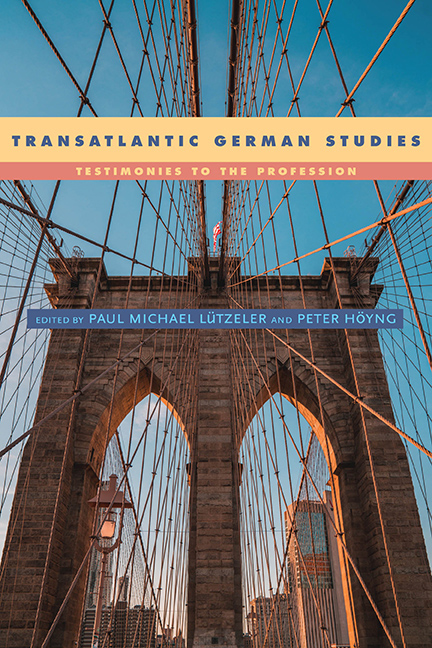Book contents
- Frontmatter
- Dedication
- Contents
- Acknowledgments
- Introduction
- From Erfahrungshunger to Realitätshunger: Futurity, Migration, and Difference
- In-between: The Participant as Observer—The Observer as Participant
- Transatlantic Space and My Own History of Globalization
- Deplazierte Personen: Why Would an American Become a Germanist?
- Metamorphoses and Meanderings of a Wanderer between Worlds
- German Studies as Vocation: My Path into It, Out of It, and Back into It
- My Long Way from Germanistik to Afro German Studies
- Mustang Red: My American Road to Critical Theory
- Third Place: How a French Germanist Became an Applied Linguist in America
- Transatlantic Exchanges: German Studies—European and American Style
- Being at Home in the Other: Thoughts and Tales from a Typically Atypical Germanist
- After Australia: Triangulating an Intellectual Journey
- A Tale in Translation: An Academic Itinerary from Istanbul to Bryn Mawr
- Beyond Passing: Transculturation in “Contact Zones”
- Far from Where? Germanistik between the Continents
- Epilogue: The Usefulness of Useless Studies
- Index
Transatlantic Space and My Own History of Globalization
Published online by Cambridge University Press: 14 February 2019
- Frontmatter
- Dedication
- Contents
- Acknowledgments
- Introduction
- From Erfahrungshunger to Realitätshunger: Futurity, Migration, and Difference
- In-between: The Participant as Observer—The Observer as Participant
- Transatlantic Space and My Own History of Globalization
- Deplazierte Personen: Why Would an American Become a Germanist?
- Metamorphoses and Meanderings of a Wanderer between Worlds
- German Studies as Vocation: My Path into It, Out of It, and Back into It
- My Long Way from Germanistik to Afro German Studies
- Mustang Red: My American Road to Critical Theory
- Third Place: How a French Germanist Became an Applied Linguist in America
- Transatlantic Exchanges: German Studies—European and American Style
- Being at Home in the Other: Thoughts and Tales from a Typically Atypical Germanist
- After Australia: Triangulating an Intellectual Journey
- A Tale in Translation: An Academic Itinerary from Istanbul to Bryn Mawr
- Beyond Passing: Transculturation in “Contact Zones”
- Far from Where? Germanistik between the Continents
- Epilogue: The Usefulness of Useless Studies
- Index
Summary
Where We Began
BETWEEN THE GERMANS who came to the US to pursue a scholarly career in our field and the Americans who traveled to Europe as part of their studies, there is an obvious symmetry in the shared processes of displacement and leaving home, but there is also an equally significant difference: on the one hand, the seeming naturalness of choosing to study one's own culture, albeit in a foreign context, and on the other, the apparently arbitrary choice to devote oneself to the examination of a foreign language and literature. Both situations irritate conventional expectations and therefore provoke a not-so-subtle pressure to justify one's choice. On visits in Germany, German-born scholars pursuing careers in the US can face questions from friends and family as to how and why they chose a life in America, and such interrogations may become, so I have been told, particularly pointed when transatlantic political tensions are high. Meanwhile, American-born scholars of German-speaking countries sometimes face an analogous pressure from their acquaintances to justify their choice of career and specialization, in a way that colleagues in other academic disciplines or in the professions do not. Not only must we scholars of German literature explain the choice of a humanities career, itself already incomprehensible to many, but also why choose German-speaking countries, of all places.
The Experience
Part of the response to such challenges involves our fascination with what has developed into transatlantic interdisciplinary German studies. While that elaborate designation does not name the field we entered decades ago, it surely describes the field we have formed and transformed. The disciplinary metamorphosis from Germanistik to German studies has to do with the encounters among different intellectual traditions: how young Americans responded to modalities of European, especially
- Type
- Chapter
- Information
- Transatlantic German StudiesTestimonies to the Profession, pp. 37 - 55Publisher: Boydell & BrewerPrint publication year: 2018

